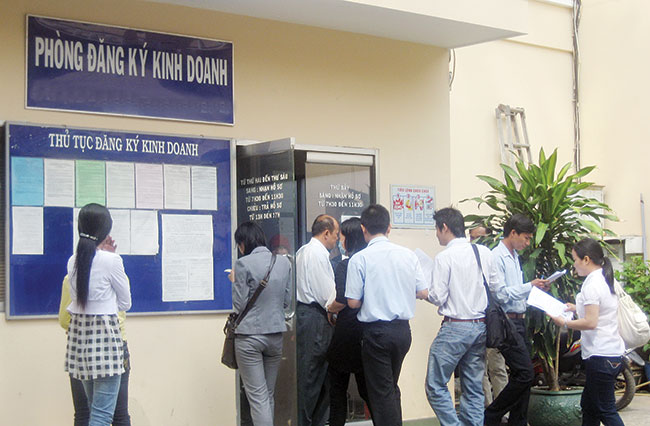PM to eliminate ‘ask-give’ mechanism

The government will change its current methods to a more proactive approach-Photo: Le Toan
While chairing the debut meeting of the new cabinet, the newly-elected PM stressed that the new government would have to “clarify its function as a state management body and a market regulator”.
“It is crucial now to work towards eliminating the ‘ask-give’ mechanism. The government will only focus on making policies and creating an environment conducive to business development,” Phuc said.
The oft-used term ‘ask-give mechanism’, refers to the means of governing society by orders rather than the rule of law, such that actions by lower officials are contingent on receiving approval from superiors, with various ‘favours’ exchanged in return.
“The government must change its working methods in order to avoid becoming a burden to citizens and businesses, as it is now,” Phuc stated.
Tran Dinh Thien, head of the Vietnam Economic Institute, told VIR that Phuc’s words were “a great message to the public and enterprises, affirming the government’s strong determination to build a more public and business-friendly government.”
“The government should have done this a long time ago, due to pressures to reform,” Thien said. “I believe changes in the role of the state from being a producer and owner to being a facilitator, service provider, and regulator can be made successfully.”
Thien said that Vietnam’s deeper international integration is forcing the government to change its attitude towards private enterprises.
Over the past several years, the international community has urged the government to reform its methods by reducing its direct involvement in the market, which is often conducted via administrative orders and the commercialisation of state institutions.
According to the landmark Vietnam 2035 report, a joint Vietnam-World Bank Group study, the Vietnamese government has been heavily engaged in economic activities in various ways: directly, through state-owned enterprises (SOEs) and large economic groups, and indirectly, through close links between the state and an exclusive segment of the domestic private sector.
Currently, Vietnam has about 800 SOEs holding assets worth $142.86 billion and total capital of $52.38 billion.
Beyond its costs to the economy, the commercialisation of state institutions weakens the effectiveness of the state itself. “It creates powerful incentives for public officials to exploit their regulatory powers and allocations of property rights to lock in long-term benefits for themselves, their families, or their networks. Such abuses of public authority undermine the legitimacy of state institutions,” noted the report.
Thien also noted that “it will be difficult to implement the prime minister’s new message. This is because it will affect influential vested interests related to resource allocation and public investment, which links to corruption.”
However, according to a government release, regarding the fight against corruption and wastefulness, the prime minister affirmed that the new government “will be determined to build the government’s integrity, transparency and efficiency by getting rid of corruption and wastefulness.”
Meanwhile, Nguyen Dinh Cung, head of the Central Institute for Economic Management, said that if the government made greater efforts, Phuc’s message might be successfully realised.
What the stars mean:
★ Poor ★ ★ Promising ★★★ Good ★★★★ Very good ★★★★★ Exceptional
Latest News
More News
- Foreign leaders extend congratulations to Party General Secretary To Lam (January 25, 2026 | 10:01)
- 14th National Party Congress wraps up with success (January 25, 2026 | 09:49)
- Congratulations from VFF Central Committee's int’l partners to 14th National Party Congress (January 25, 2026 | 09:46)
- 14th Party Central Committee unanimously elects To Lam as General Secretary (January 23, 2026 | 16:22)
- Worldwide congratulations underscore confidence in Vietnam’s 14th Party Congress (January 23, 2026 | 09:02)
- Political parties, organisations, int’l friends send congratulations to 14th National Party Congress (January 22, 2026 | 09:33)
- Press release on second working day of 14th National Party Congress (January 22, 2026 | 09:19)
- 14th National Party Congress: Japanese media highlight Vietnam’s growth targets (January 21, 2026 | 09:46)
- 14th National Party Congress: Driving force for Vietnam to continue renewal, innovation, breakthroughs (January 21, 2026 | 09:42)
- Vietnam remains spiritual support for progressive forces: Colombian party leader (January 21, 2026 | 08:00)
















 Mobile Version
Mobile Version